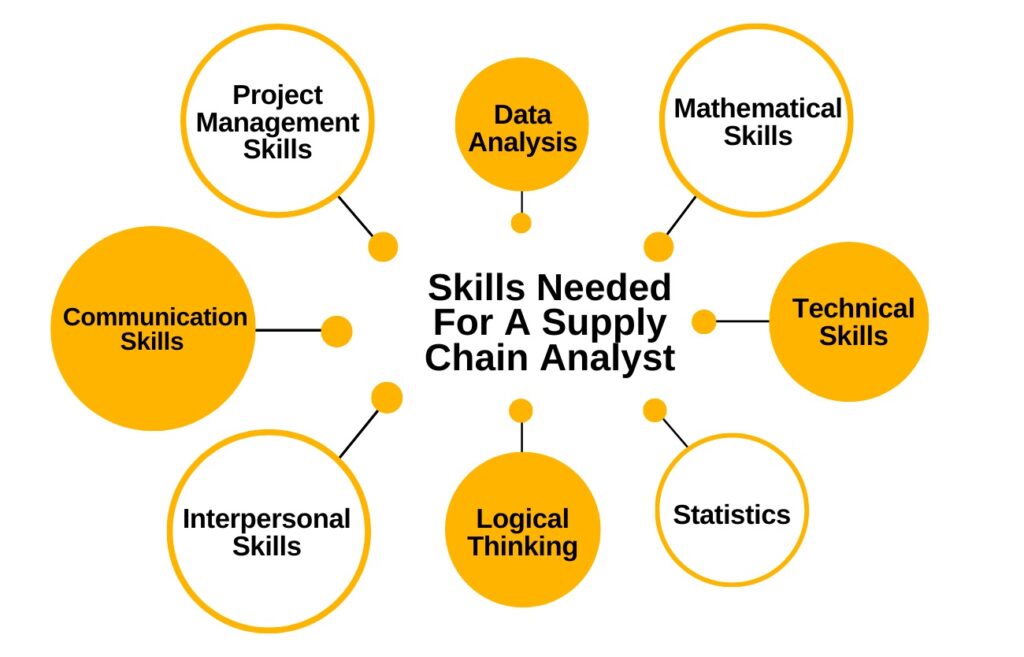A supply chain analyst is a professional who plays a crucial role in optimizing the flow of goods and services from the point of origin to the final consumer.
You can consider supply chain analyst is like a detective who solves problems in how things get from the factory to your home. They use numbers and information to find ways to make the process faster, cheaper, and more efficient.
They turn numbers into decisions with the help of analytics and solve supply chain business problems.
If that seems interesting than this article on ” How to Become Supply Chain Analyst ” is surely for you.

How Supply Chain Analysts Use The Power Analytics
Supply chain analysts use the data to identify patterns, trends, and insights that can be used to improve supply chain performance. They help to improve the process of supply chain in following ways.
- Forecast demand: Predict future demand for products and services.
- Optimize inventory levels: Determine the optimal level of inventory to hold.
- Improve transportation efficiency: Identify the most efficient routes for transporting goods.
- Reduce costs: Find ways to reduce costs throughout the supply chain.
- Improve customer satisfaction: Ensure that products and services are delivered on time and in good condition.
What are the Roles and Responsibilities of a Supply Chain Analyst ?
From collecting data to turning the data into insights and take data driven decision there is a big range of responsibilities that are to be completed by a supply chain analyst.

A supply chain analyst major responsibilities include taking or recommending decisions that will help a supply chain industry improve their performance by finding out the loop holes.
They also over view trends for different KPI’s to track and measure the trend’s so as to take important data driven decisions.
- Collecting and analyzing data: Gathering data from various sources, such as ERP systems, transportation management systems, and warehouse management systems.
- Developing and using data models: Creating and using data models to analyze data and identify trends.
- Identifying areas for improvement: Identifying areas where the supply chain can be improved.
- Developing and implementing improvement plans: Developing and implementing plans to improve the supply chain.
- Monitoring and reporting on performance: Monitoring the performance of the supply chain and reporting on key performance indicators (KPIs).
Supply Chain Analyst Career Options
There are many career paths that you can take as a supply chain analyst. There are so many options to choose if you decide to get into supply chain analytics .Some of the most common career paths include:
- Supply Chain Manager: Overseeing the entire supply chain process.
- Procurement Manager: Managing the procurement of goods and services.
- Logistics Manager: Managing the transportation and storage of goods.
- Inventory Manager: Managing inventory levels and ensuring efficient stock management.
- Supply Chain Consultant: Providing expert advice to organizations on supply chain issues.
Skills Needed to Become a Supply Chain Analyst

To become a successful supply chain analyst, you need to have a strong foundation in analytical skills, as well as knowledge of supply chain management principles. Some of the key skills that you will need include:
- Strong analytical skills: The ability to analyze data and identify trends.
- Problem-solving skills: The ability to identify and solve problems.
- Technical skills: Proficiency in data analysis tools, such as Excel, SQL, Power BI and Python.
- Communication skills: The ability to communicate effectively with stakeholders.
- Project management skills: The ability to manage multiple projects simultaneously.
- Logical thinking: Logical thinking is very useful on taking decisions in complex situations.
What is the salary of a Supply Chain Analyst

The salary for a Supply Chain Analyst can vary significantly based on several factors, including:
- Location: Salaries tend to be higher in metropolitan areas and developed countries.
- Experience: More experienced analysts generally command higher salaries.
- Industry: Specific industries like technology, healthcare, and manufacturing often offer higher compensation.
- Company Size: Larger companies may pay more than smaller ones.
- Education and Certifications: Advanced degrees and certifications can boost earning potential.
Here’s a general breakdown of average salaries:
- Entry-Level: Typically around $50,000 to $70,000 per year.
- Experienced: $75,000 to $100,000 per year.
- Senior: $100,000 or more, often with additional benefits like bonuses and stock options.
One of the most sought after profile in Supply Chain Analytics is Freight Management Business Analyst
How to Become Supply Chain Analyst.

To become a supply chain analyst you have get right set of education and you shall be good at logical and statistical analysis.
Here are traditional steps to become a supply chain analyst.
1. Get the Right Education
- Earn a Bachelor’s Degree: Begin with a degree in fields like supply chain management, logistics, or business. This knowledge will give you a solid foundation to understand supply chain dynamics.
2. Develop Essential Skills
- Analytical Thinking: Learn how to analyze data to make informed decisions.
- Technical Proficiency: Familiarize yourself with supply chain software (like SAP or Oracle) and tools for data analysis (such as Excel , Power BI , SQL).
- Effective Communication: Work on conveying your insights clearly to colleagues and stakeholders.
- Problem-Solving: Strengthen your ability to identify challenges and propose practical solutions.
- Attention to Detail: Be meticulous in your analyses to avoid errors that could impact decisions.
3. Gain Hands-On Experience
- Internships: Seek internships while studying to get practical experience in supply chain operations. This exposure helps you understand real-world challenges.
- Entry-Level Positions: Start with roles like supply chain coordinator or logistics assistant to build your skills and knowledge.
4. Consider Professional Certifications
- Pursue Relevant Certifications: Certifications such as the Certified Supply Chain Professional (CSCP) or Certified in Production and Inventory Management (CPIM) can enhance your qualifications and set you apart in the job market.
5. Network in the Field
- Join Professional Associations: Engage with organizations like the Council of Supply Chain Management Professionals (CSCMP) to connect with industry peers and access valuable resources.
- Attend Industry Events: Participate in workshops and conferences to learn more and network with professionals.
6. Stay Updated on Industry Trends
- Follow Industry News: Keep abreast of the latest trends and technologies in supply chain management by reading relevant articles, journals, and online resources.
7. Craft a Compelling Resume
- Highlight Your Skills and Experience: Make sure your resume showcases your relevant education, skills, and practical experiences tailored to supply chain roles.
8. Apply for Analyst Positions
- Look for Job Openings: Search for supply chain analyst positions on job boards and company websites. Prepare for interviews by practicing responses to common questions related to supply chain analytics.
9. Embrace Lifelong Learning
- Commit to Continuous Improvement: The field of supply chain management is always evolving, so stay dedicated to learning new skills and methodologies throughout your career.
Conclusion
The role of a Supply Chain Analyst is vital in today’s fast-paced business landscape. By harnessing data and analytical skills, these professionals drive efficiency, reduce costs, and enhance customer satisfaction.
As organizations face new challenges, the demand for skilled analysts will only increase. Embracing this role can lead to significant improvements in supply chain operations, making it a compelling career choice for those looking to make a tangible impact in their field.
FAQs About Supply Chain Analysts
What is the role of a Supply Chain Analyst?
Supply Chain Analyst is responsible for evaluating and improving supply chain processes by analyzing data related to procurement, logistics, inventory, and distribution. They identify inefficiencies and suggest strategies to optimize operations, reduce costs, and enhance service levels.
What skills are needed to be a successful Supply Chain Analyst?
Key skills include strong analytical abilities, proficiency in data analysis tools (like Excel and SQL), knowledge of supply chain management concepts, effective communication skills, and problem-solving capabilities. Familiarity with ERP systems and data visualization tools is also beneficial.
What educational qualifications are typically required?
Most positions require a bachelor’s degree in supply chain management, logistics, business administration, or a related field. Advanced degrees or certifications (such as APICS or ISM) can enhance career prospects and demonstrate expertise.
What career advancement opportunities exist for Supply Chain Analysts?
With experience, Supply Chain Analysts can progress to roles such as Supply Chain Manager, Operations Manager, or even senior executive positions like Chief Supply Chain Officer. Continuous learning and obtaining relevant certifications can further enhance career growth.


One thought on “How to Become Supply Chain Analyst : Salary and Job Description”